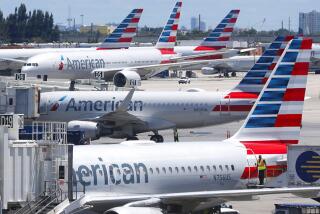United to Cut Domestic Schedule
- Share via
United Airlines, increasingly squeezed by discount carriers in the U.S. market, is scaling back its domestic flight schedule and expanding its international presence in the push to become profitable again.
The change in focus announced Wednesday means the world’s second-largest carrier will be offering slightly fewer departures per market in the U.S. and flying more regional jets as it moves to reduce its domestic capacity 12% by March.
International capacity will be boosted by 14% as United looks to its more lucrative overseas routes -- particularly those to China, Japan and Vietnam -- to help it return to profitability after four straight years of losses.
Intent on slashing costs further to end its 22-month stay under bankruptcy protection, United said the moves would reduce overall capacity by 3% and shrink its fleet to 455 aircraft by March, down from 523 in August and nearly 20% since 2002.
“Fundamental changes in our industry, including ongoing high fuel costs, intense pricing pressure and continuing overcapacity, demand that we take aggressive steps now in implementing this plan to ensure that United remains competitive,” said Glenn Tilton, chief executive of United and its parent company, UAL Corp.
With the changes, international operations would account for more than 40% of United’s capacity and slightly over half of its revenue.
The moves come with United and other large legacy carriers continuing to lose ground to discount carriers such as JetBlue Airways Corp. and Southwest Airlines Co., whose lower costs enable them to offer cheap fares that make little economic sense for the biggest airlines.
“As a legacy network carrier, it makes a lot of sense to put your assets into the international arena” where pricing is more rational, said aviation industry consultant Jon Ash of Global Aviation Associates in Washington. “United has a great international network, so it’s a very logical move.”
Morningstar Inc. analyst Chris Lozier said it probably would be several years before United faced an international challenge from low-cost carriers, which fly smaller planes and would have to clear regulatory hurdles in order to gain access to key overseas markets.
United said it had no immediate plans to drop service to any of the cities it serves and would continue to operate its U.S. hubs of Chicago, Denver, Washington, San Francisco and Los Angeles.
“It’s a moderate downsizing of our capacity, spread very evenly throughout the system,” United executive John Tague said.
No specifics were announced concerning flights to be dropped or shifted to regional carriers that operate flights as United Express.
More to Read
Inside the business of entertainment
The Wide Shot brings you news, analysis and insights on everything from streaming wars to production — and what it all means for the future.
You may occasionally receive promotional content from the Los Angeles Times.










